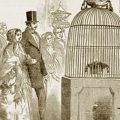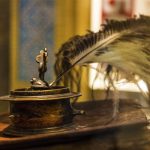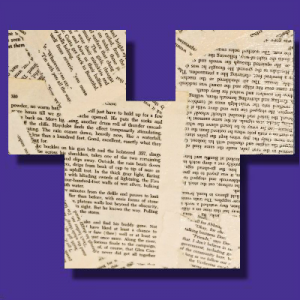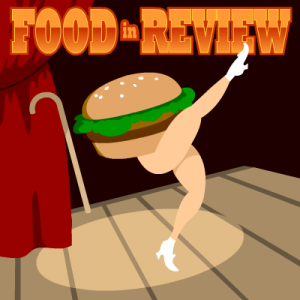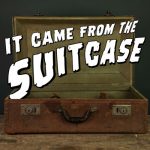This story first appeared in Curios and Conundrums Volume 3 Issue 4 from The Mysterious Package Company
Polk’s trademark red plaid trapper hat made him easy to spot. His ankle-length duster yawned open to reveal a novelty “I’m with stupid” T-shirt, and he took a moment or two to calculate where to walk so that the arrow would point at me.
“It’s a robbery!” he enthused, somewhat indiscreetly, as we passed through the cemetery gates together. “A graaaave robbery!” As we rounded a wide bend, a police cruiser came into view atop a gentle slope, and I could discern the stocky form of Constable Pedro Valdez stooped over his casebook.
“Constable Valdez!” exclaimed Polk and, upon glancing down at his own T-shirt, hastily repositioned himself to try yet again to get the arrow to point at me. Valdez was tapping his pen on his casebook, deep in thought. On his cruiser nearby, a few salient articles were arranged on the hood. Next to the car was the crime scene, laid plain to the casual observer: a grave had been hastily excavated by shovel and the top of a casket exposed, its lid gaped indecently open. As Polk and I drew nearer, I observed that the casket’s dessicated tenant remained resident.
“Go away, Polk,” said Valdez wearily, without looking up.
“Go away?” started Polk. “And allow you to bungle another one? Hardly.” Valdez’s hand clenched ever more tightly around his pen, as he continued writing. “Tell me, Officer Valdez,” said Polk pompously, “how can you possibly expect to solve this case, when you have been awake since four in the morning?”
“Simply amazing, Polk!” I ejaculated. “How could you possibly have known that?”
Valdez looked up angrily from his notebook. “Because he called me on my private line in the middle of the night,” he said through gritted teeth. “I don’t even know how you got my home number, Polk. I had it changed last week.”
“Simply… amazing,” I repeated, with somewhat less conviction. “I imagine that would be a difficult number to get.”
“Here lies buried Mrs. Alexandra Whitlam,” announced Polk abruptly, stabbing the air with his finger, “who died last year at the ripe old age of 82, and now her immortal slumber has been similarly disturbed.”
I gasped, with renewed awe. “But Polk! How did you…”
“Written on the headstone,” said Valdez flatly.
“And her husband,” continued Polk, “buried… just yesterday, wasn’t it?”
“By jove, Polk!” said I. “You never cease to…”
“Other headstone,” said Valdez, cutting me off. Indeed, the neighbouring grave had a newness about it that was betrayed by a polished black headstone, and a rectangular blanket of recently rolled sod outlined on all sides by a strip of by freshly dug earth.
“Very unusual,” said Polk, clambering down into the woman’s grave. The sandy clay substrate caused him to slip, such that he very nearly wound up inside the coffin himself.
“Get out of there, Polk!” shouted Valdez, “This is an active crime scene!” By then, of course, it was too late, as Polk was already examining the half-buried casket with his trusty magnifying glass. “There’s a lock on it!”
“Yes, I realize,” sighed Valdez. “Polk, that lock has to be four inches wide, why do you need a mag…”
“And no sign of forced entry,” continued Polk, his eye now appearing comically large through the glass. “Whoever opened the casket had a key.”
“Polk, if you don’t get out of there, I’ll have you for obstructing a peace officer… again,” Valdez warned, but Polk was already hoisting himself out of the hole. He continued his conjecture anon.
“Something of value was locked in that casket,” Polk ruminated, pacing back and forth in front of the two graves. “Something valuable enough… to steal.” Like a certain internet groundhog, he spun around dramatically to look at Valdez and me, as if expecting amazement at this deduction. He pouted at discovering us unphased.
“But why lock something valuable away in a casket, rather than retaining it to the benefit one’s own estate?” I asked.
“Something sentimental,” Polk reasoned. “And the lock was to prevent precisely this sort of theft from happening.”
“Who but Mr. Whitlam would have the key?” I wondered.
“No-one-who!” declared Polk, holding aloft an evidence bag that he had snatched from the hood of the police cruiser. Inside was a silver key of significant size, looped onto a string which had been snapped in the middle.
“Put that down, Polk!” shouted Valdez, grabbing at it like a child playing keep-away.
“Behold the very key itself, snatched from the neck of Mrs. Whitlam’s recently departed widower by none other than…” At this, Polk let the dramatic tension build significantly, before shouting “The grave…”
“The gravedigger,” said Valdez simultaneously, and with considerably less pomp.
“…digger!” The light in Polk’s eyes was snuffed out immediately, and a mixture of confusion and petulance came over his face.
Valdez massaged his temple and took a long, deep breath. “Polk, I have all this already.” He tapped his casebook with his pen. “Elmtree employs two gravediggers. Mr. Hughes works the day shift, while Mr. Roland works…”
“The graveyard shift?”
Valdez steamrolled past this, ever more annoyed.
“Mr. Whitlam’s funeral was held here yesterday afternoon,” he explained. “The mourners all cleared out by 4:30 — ugh, why am I telling you all this? — and the shift changeover is at 6pm. In my interview with him, Mr. Roland claimed that by the time he had arrived for work, the damage was done: Mrs. Whitlam had been partially disinterred, and daytime gravedigger Mr. Hughes had made off with her diamond brooch, leaving only his cap behind.”
He said this just as Polk was straightening that very cap on his own head, having doffed his own plaid trapper onto the hood of the car.
“Give me that,” said Valdez, grabbing at the cap. “That’s evidence, Polk.”
Polk dodged him by taking two prancing steps backwards, defiantly smoothing his hand over the top of the filthy cap, which bore a murky and faded patch depicting the state of Florida. “And, uh… what time did you receive the call about the theft?”
Valdez made another impotent grab for the cap. “Shortly after 6pm, from Mr. Roland himself.” On this last word, Valdez successfully snatched the cap from Polk’s head.
“Have you any hope of catching Hughes?” I asked.
“He lives alone in a rented flat,” said Valdez. “I’ve already been by to question his landlady, but she hasn’t seen him.”
“That’s because he never went home!” exclaimed Polk triumphantly.
“Well, yes, obviously,” said Valdez. “But after carefully studying the facts, I think I know exactly where Mr. Hughes is right now.”
Valdez snapped his casebook shut and looked at us with a defiant smugness. Silent expectation hung in the air, and I looked imploringly at my man Polk.
“Well… s-so do I,” Polk claimed.
He was, as usual, just a hair off the mark. But how did Constable Valdez know where gravedigger Hughes had gone?
Click here to find out!
“So where is Mr. Hughes, the daytime gravedigger?” I asked Polk.
As if to prolong my suspense, Polk produced a coil of dental floss from his pocket and set to cleaning his teeth with it.
“In Slorida,” he eventually proclaimed, grimacing so that he could reach the distal side of his left maxillary first bicuspid.
“I’m sorry… did you say Florida?” asked Constable Valdez.
“Yef!” Polk confirmed. “The pash on Hughes’s caf faid ‘Slorida,’ whish ish where he yust ye.”
A sarcastic smile crossed Valdez’s lips. “How does it follow that a man robs a grave and flees to Florida, merely due to the fact that his cap says ‘Florida’ on it?”
Polk stopped mid-floss and looked momentarily dumbfounded, but recovered quickly.
“It doesn’t,” he answered, wrapping the floss around his finger, tucking it back into his pocket, and smacking his lips. “I wanted to make sure you were following along, so that my considerable powers of deduction weren’t wasted on you.”
Valdez rolled his eyes.
“No,” said Polk authoritatively, “What happened here was clearly a case of the dead rising from the grave.” He said this in a spooky voice halfway between a passable Vincent Price impression and Bobby “Boris” Pickett from Monster Mash. Valdez folded his arms and leaned against his patrol car, settling in for one of Polk’s famous explanations.
“Are you familiar with safety coffins?” Polk began. Valdez shook his head indifferently. “Of course you’re not.” Polk squared his shoulders with Valdez and me, and began his lecture. “Safety coffins were a mainstay of the mid-19th century, and were invented to allay people of the common fear of being buried alive. In one popular configuration, a small housing containing a bell would be installed above ground, with a string leading through a tube into the coffin. If the supposed ‘deceased’ actually woke up post-burial, he could avail himself of the trailing string and apply a desperate tug, ringing the bell above ground and alerting someone like … oh, I don’t know… a passing gravedigger to his predicament. And that is what happened here yesterday afternoon.”
“So poor old dead — and embalmed! — Mr. Whitlam woke up to find himself buried alive, and rang a bell to alert the gravedigger?” asked Valdez incredulously. “Polk, there’s no bell attached to that gravesite.”
“Nor does their need to be,” Polk shot back testily. “Because the earth here is so soft — clay and sand, all of it — that a shouted protest from within the coffin could easily be heard above ground.”
Valdez looked gobsmacked, which Polk took as encouragement. He continued.
“Once Hughes heard the anguished cries of Mr. Whitlam, he hurriedly dug him up out of the grave, thereby saving his life. Whitlam jubilantly snapped the coffin key from his neck and promised to reward gravedigger Hughes with the valuable brooch that was buried in his wife’s casket, if Hughes would only help dig it up. The two men set to robbing Mrs. Whitlam’s grave together, except that it wasn’t robbery, was it? For it was arguably Mr. Whitlam’s own property that he was burglarizing.”
I glanced over at Valdez, whose jaw hung slack.
“Mr. Hughes is currently sunning himself on a beach somewhere with the proceeds he earned from selling that brooch. If not Florida, then likely Myrtle Beach.”
With a puckish smirk on his face, Polk took a modest bow, while I applauded him enthusiastically.
“Bravo, Polk! Absolutely amazing!” I shook my head giddily and turned, smiling, to Constable Valdez, through whose gaping maw one might have driven a wild Clydesdale. All was silent in the graveyard for a few moments, with only the distant cawing of a crow to punctuate the placidity.
“Polk,” said Constable Valdez when he had finally recovered, “You’re an idiot.”
Polk’s face sank. Now it was Valdez’s turn.
“You were right about one thing,” he explained, “And perhaps only one thing: two men certainly did disinter poor Mrs. Whitlam.”
Polk’s countenance brightened, and I watched him give himself a mental pat on the back.
“The interval between the end of Mr. Whitlam’s funeral and the gravediggers’ shift change could not have been more than…”
“Twenty-seven minutes!” interrupted Polk.
“An hour and a half,” Valdez corrected him. “And in that time, we are to believe that one man dug out most of a six-foot grave before the next man arrived for work? By my calculations, and even with the earth as soft as it is, it would have taken twice as long to accomplish that task.”
“Either twice as long,” I offered, “Or…”
“Three men!” shouted Polk.
“Two, Polk,” said Valdez, looking embarrassed for him. “It’s… it’s two men.”
Polk began to count on his fingers as Valdez continued.
“Hughes and his accomplice, knowing that something of value was doubtlessly stashed away in Mrs. Whitlam’s locked casket, colluded to search her husband’s coffin once the mourners had cleared out. That’s where they found what they were hoping to find, hanging around Mr. Whitlam’s neck: the key. They eag…”
“The key!” shouted Polk, about a second too late.
“They eagerly set to digging out the second grave together, and retrieved their treasure. But they could not agree on how to split their newfound wealth, and a quarrel ensued.”
“Who was this unnamed accomplish, Constable Valdez?” I asked.
“You haven’t put that together?” he inquired haughtily. Why, it was none other than Mr. Ro…”
“Ignatius Polk!” said Ignatius Polk. Valdez ignored him.
“It was Mr. Roland, the night shift gravedigger.” Upon seeing my astonished look, he explained. “The secret of what was in that coffin, Mrs. Whitlam literally took to her grave. Certainly, neither of the gravediggers would have known what it was, as they do not attend the gravesite during funerals, and the casket was doubtless locked by the time they could access it privately. No, they would have buried old Mrs. Whitlam, always wondering what had been secreted away inside what is likely one of the only locked caskets on the property.
“And yet,” he went on, “Mr. Roland accused Mr. Hughes of stealing ‘the brooch.’ How could he have known the stolen object was a brooch, if the thieving Hughes was supposedly long gone before Roland arrived for work?”
He glanced at both of us to ensure that we were following along. It was not clear that Polk actually was.
“No, Roland knew what was in the locked casket, because he was there when it was opened. But the two men fought bitterly over the brooch, and only one of them survived the squall.”
“Egad, Valdez! You’re not suggesting…”
“Did you think it was odd that the only item Hughes supposedly left behind was his cap? If the lowly gravedigger had really stolen a fabulous treasure and had gone on the lam, never to return again, what else might he leave behind?”
I looked at Polk expectantly before answering.
“His shovel,” I replied.
“His shova,” Polk repeated incoherently, having misheard me.
Valdez nodded. “Before calling the police, Roland had just enough time to backfill Mr. Whitlam’s grave and roll the sod back over the site, such that he would appear to have made the call shortly after his shift started. So I ask you: where is Mr. Hughes now?
“F… Florida?” ventured Polk.
“Four feet under,” declared Valdez, “draped across the top of Mr. Whitlam’s casket!”
I let out an audible gasp, and my mind boggled. Polk nodded his head, and sagely added “Exactly.”
Sure enough, during the coming evening, Polk and I watched from a strictly enforced distance while four police officers dug out Mr. Whitlam’s freshly-filled grave. In less than an hour, they discovered the body (and shovel) of daytime gravedigger Mr. Hughes, whose head had been caved in with a certain broad, flat implement. (“A shova,” whispered Polk in amazement.) Mrs. Whitlam’s indescribably beautiful diamond brooch would later be recovered from the dastardly Mr. Roland.“Well, Polk, you’ve done it again,” I said to him, before realizing the space beside me had been vacated. I turned around, and then chuckled to myself as I watched Ignatius Polk, confounding detective, gleefully chasing a crow across the misty graveyard.


